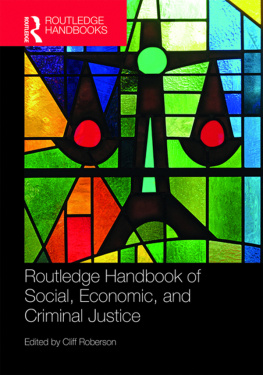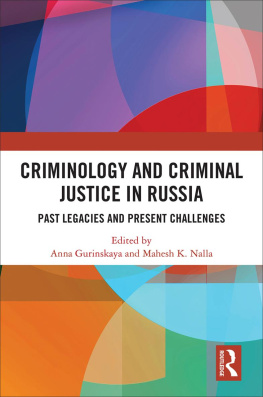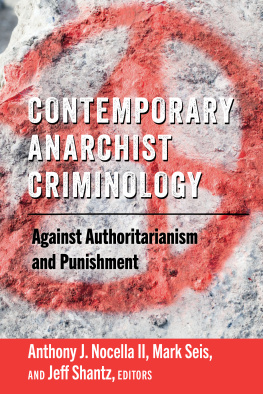The International Library of Sociology
CRIMINAL JUSTICE AND SOCIAL RECONSTRUCTION
Founded by KARL MANNHEIM
The International Library of Sociology
THE SOCIOLOGY OF LAW AND CRIMINOLOGY
In 15 Volumes
| I | Comparative Criminology - (Part One) | Mannheim |
| II | Comparative Criminology - (Part Two) | Mannheim |
| III | Crime: An Analytical Appraisal | Lpez-Rey |
| IV | The Criminal Area | Morris |
| V | Criminal Justice and Social Reconstruction | Mannheim |
| VI | The Education of Borstal Boys | Stratta |
| VII | The English Prison and Borstal Systems | Fox |
| VIII | The Explanation of Criminality | Trasler |
| IX | Group Problems in Crime and Punishment | Mannheim |
| X | The Institutions of Private Law | Renner |
| XI | Juvenile Delinquency in an English Middletown | Mannheim |
| XII | Legal Aid | Egerton |
| XIII | Pentonville | Morris et al |
| XIV | Social Defence | Ancel |
| XV | Young Men in Detention Centres | Dunlop et al |
First published in 1946
by Routledge
Reprinted in 1998, 2001 by Routledge
2 Park Square, Milton Park, Abingdon, Oxon, OX14 4RN
Transferred to Digital Printing 2007
Routledge is an imprint of the Taylor & Francis Group
1946 Hermann Mannheim
All rights reserved. No part of this book may be reprinted or reproduced or utilized in any form or by any electronic, mechanical, or other means, now known or hereafter invented, including photocopying and recording, or in any information storage or retrieval system, without permission in writing from the publishers.
The publishers have made every effort to contact authors/copyright holders of the works reprinted in The International Library of Sociology. This has not been possible in every case, however, and we would welcome correspondence from those individuals/companies we have been unable to trace.
British Library Cataloguing in Publication Data
A CIP catalogue record for this book is available from the British Library
Criminal Justice and Social Reconstruction
ISBN 0-415-17736-7
The Sociology of Law and Criminology: 15 Volumes
ISBN 0-415-17832-0
The International Library of Sociology: 274 Volumes
ISBN 0-415-17838-X
Publishers Note
The publisher has gone to great lengths to ensure the quality of this reprint but points out that some imperfections in the original may be apparent
CONTENTS
PREFACE
It is sometimes difficult for an author to remember exactly when and how his work was first conceived. The origin of the present book can, however, fairly distinctly be traced back to the following factors: First, to the incompleteness of my earlier booksThe Dilemma of Penal Reform and Social Aspects of Crime in England between the Warsan incompleteness due not only to lack of space but also to my feeling that it would have been somewhat premature at the time to draw any definite conclusions from the material collected. However, when, a few years later, in summer 1942, my colleague Dr. Karl Mannheim suggested to me that I might contribute a volume to his International Library of Sociology and Social Reconstruction I welcomed his invitation as an opportunity of filling at least some of the gaps left by those earlier writings. Readers of the present volume will no doubt be aware of the links existing, for instance, between certain chapters of Social Aspects, especially those on Business Administration and similar subjects, and the economic sections of the present book ; or between the concluding Parts of the latter and of The Dilemma. A few lectures of a programmatic character delivered at a Summer School of the Fabian Society and at the South Place Ethical Society in London helped me further to clarify certain ideas which form the basis of the present book.
It is one of the most important functions of Criminal Justice to play some part in the great task of Education for Citizenship. The spirit of the Criminal Law and its administration should be such as to make this branch of the legal system something like a reliable guide through the chaos of modern societycertainly neither the only nor the most important educational factor of this kind but at least capable of holding its own among the many agencies at work. So far, Criminal Justice has often remained too much behind and out of touch with the progressive elements of social thought, and its approach to the problems of society has been too one-sided to make it a really living force. The present book represents a very modest and inevitably incomplete attempt to show how the work of Social Reconstruction might be reflected in the field of Criminal Justice. Of the shortcomings of this attempt and the many questions still left unanswered I am only too painfully aware. I am equally conscious of the many criticisms which this book will inevitably provoke. It is only too likely that at least some of them will differ but little from the doubts I might have expressed myself twenty-five years ago. This will help me to understand those who will find my present views unacceptable. I am not optimistic enough to believe that these views will, in the near future, gain widespread approval. It is well known that, for reasons which would lead too far to expound here, the legal world is the slowest in making the necessary adjustments to changes in society. The great task of the future will be to separate the valuable elements in the traditional approach from the bias rooted in vested interests and sheer unreasonableness. If the book should contribute even in a small way to making this discussion as unprejudiced and as well informed as possible, it will have achieved its object.
It gives me great pleasure to dedicate this book to my colleague Professor Harold J. Laski in appreciation of his friendly interest in my work and the great kindness he has shown to me ever since I came to this country.
Without the devoted help and the persistent encouragement which I have received from my wife neither this book nor any of its predecessors could have been written.
The manuscript of the present book was completed in April, 1945 ; material published after that date could, therefore, as a rule, be referred to, if at all, only in footnotes.
HERMANN MANNHEIM.
THE LONDON SCHOOL OF ECONOMICS AND
POLITICAL SCIENCE (UNIVERSITY OF
LONDON).
January 1946.
Every generation regards as natural the institutions to which it is accustomed. Mankind, it seems, is more easily shocked by the unusual than by the shocking.
R. H. Tawney, Equality, p. 119.
A revolutionary moment in the worlds history is a time for revolutions, not for patching.
Beveridge Report, p. 6.
Just as that bargain (with fate) is destined to be reopened in the fields of economics and politics, so, clearly, law, which is, in its ultimate substance, dependent upon these, is certain to be profoundly reconstructed in principle.





